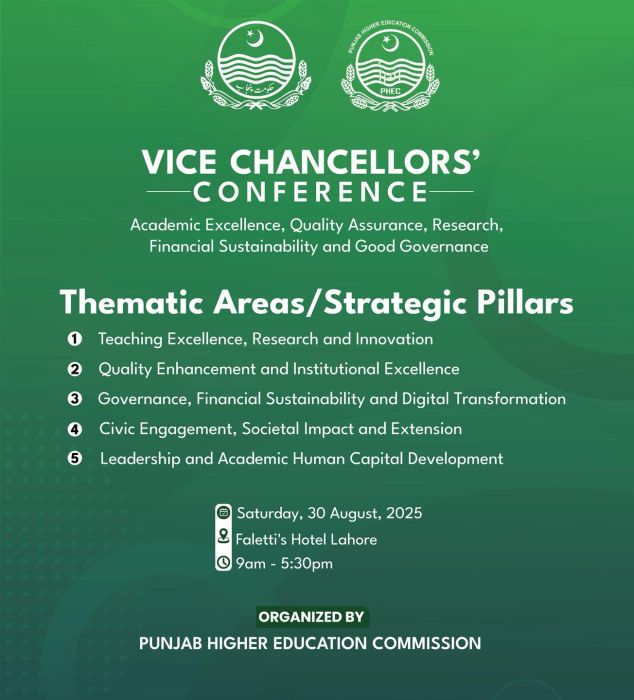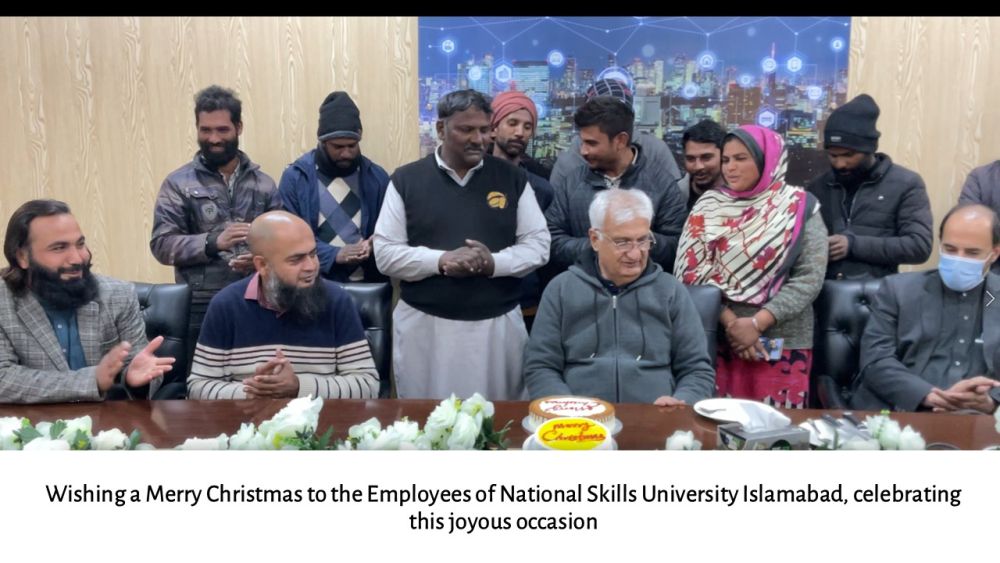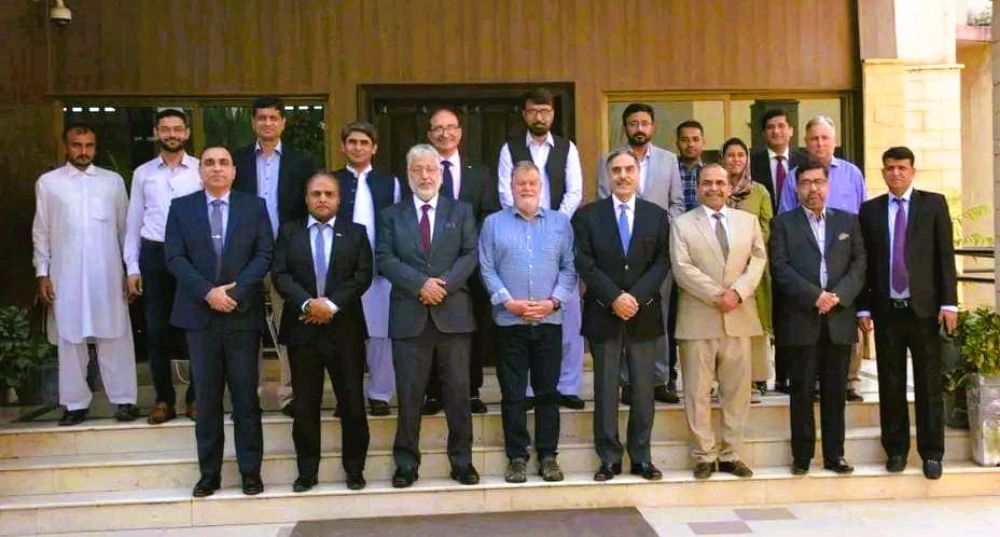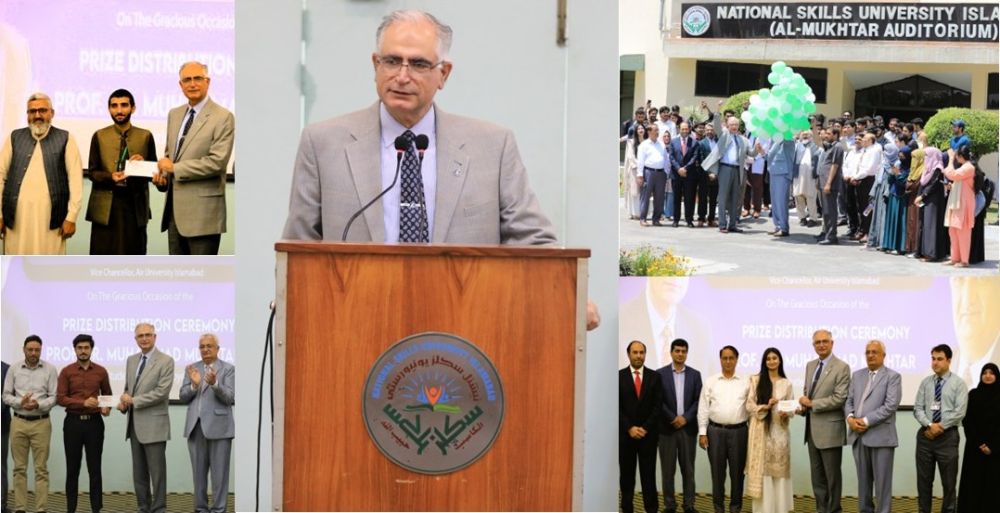188/25 Shaping the Future of Higher Education in Punjab
Posted 5 months ago
EXECUTIVE SUMMARY
Punjab’s higher education is at a turning point. The upcoming Vice Chancellors’ Conference 2025, organized by the Punjab Higher Education Commission (PHEC) in Lahore, is set to become a milestone event in redefining the province’s academic future. With a sharp focus on teaching excellence, research innovation, governance reforms, financial sustainability, civic engagement, and leadership development, the conference aims to chart a bold new course for regional universities.
Central to this transformation is the vision of Dr. Iqrar Ahmad Khan, Chairperson of PHEC, whose leadership has shifted efforts from policy rhetoric to practical, measurable reforms. His emphasis on quality assurance, institutional excellence, and collaborative research has positioned PHEC as a driver of systemic change. A highlight of the conference will be the launch of Research & Development Clusters, a non-brick-and-mortar framework to foster inter-university collaboration, innovation, and resource sharing across Punjab.
According to Professor Dr. Muhammad Mukhtar, a world-renowned researcher and scholar, the conference shows Punjab’s strong commitment to improving its universities and making them world-class by bringing together university heads, policymakers, and experts in one place.
He further says that the momentum created by Prof Dr. Khan’s leadership reflects a strategic pivot: from fragmented growth to collaborative excellence, from incremental change to systemic transformation. Punjab’s higher education sector is preparing for a reset that promises long-term academic, social, and economic dividends. This reset will improve the quality of education and contribute to the region's social and economic development, giving us all reasons to be optimistic about the future.
The Punjab Higher Education Commission (PHEC) is set to host the Vice Chancellors’ Conference 2025 in Lahore, an event that could transform the future of universities in Punjab and make a lasting impact on Pakistan’s education system.”
This gathering is more than a ceremonial forum. It is a decisive step toward aligning Punjab’s higher education with international benchmarks, fostering collaboration across institutions, and creating structures for sustainable reform. The agenda reflects the urgency of transformation: teaching excellence, research innovation, governance reforms, financial sustainability, civic engagement, and academic leadership.
At the heart of this renewed momentum stands Dr. Iqrar Ahmad Khan, the current Chairperson of PHEC, whose tenure has already begun to shift the conversation from incremental change to systemic transformation. Since taking charge, his efforts have redefined how higher education in Punjab is discussed, structured, and envisioned.
A Strategic Shift in Priorities
Under Dr. Khan’s stewardship, PHEC has moved decisively toward quality assurance, institutional excellence, and innovation-driven teaching models. The Vice Chancellors’ Conference reflects these themes, structured around five strategic sessions that tackle the most pressing issues universities face today:
1. Teaching Excellence, Research Innovation & Knowledge Creation – ensuring faculty development and globally competitive scholarship.
2. Quality Enhancement & Institutional Excellence – building stronger institutional frameworks.
3. Governance, Financial Sustainability and Digital Transformation – addressing sustainability in an era of shrinking budgets.
4. Civic Engagement, Societal Cohesion & Extension – connecting academia with society’s real challenges.
5. Leadership & Academic Human Capital Development – preparing the next generation of higher education leaders.
This thematic architecture reflects on the shift from traditional, insular academia toward a more integrated, future-ready model of higher education.
Building Collaborative Research Ecosystems
One of the conference's most anticipated outcomes is the announcement of Research & Development Clusters, a non-brick-and-mortar initiative designed to facilitate collaborative research, resource sharing, and synergy between universities. This initiative reflects Dr. Khan’s commitment to breaking silos and enabling inter-institutional partnerships, recognizing that true innovation thrives in collaboration, not isolation.
Such clusters are expected to provide the academic community platforms for joint research ventures, addressing national challenges such as food security, climate resilience, digital governance, and public health.
Reforms with Measurable Impact
By convening thought leaders, policymakers, and industry partners at this year’s conference, PHEC is promoting debate and institutionalizing reform processes. The expectation is clear: actionable recommendations, measurable outcomes, and a declaration that will chart the next phase of higher education growth in Punjab.
Why This Matters?
Higher education is no longer a luxury for nations but a necessity. Countries that invest in academic innovation and skills development lead in economic competitiveness, societal resilience, and technological advancement. Punjab’s effort to build such a future through its higher education system reflects a strategic pivot, from quantity to quality, from insularity to collaboration, and from policy rhetoric to real reform.
The Road Ahead
If successfully implemented, the reforms being debated at the conference will transform Punjab’s universities and set an example for other provinces and neighboring countries navigating similar challenges. The introduction of collaborative R&D clusters, emphasis on governance reforms, and investment in leadership development represent steps toward building a globally competitive higher education ecosystem.
So far Dr. Iqrar Ahmad Khan's tenure as PHEC chairperson symbolizes the courage to rethink, restructure, and reimagine higher education. As the academic community gathers in Lahore, one message resonates clearly: Punjab is no longer content with incremental reforms, it is preparing for a higher education reset that could shape the province’s destiny for decades to come.





